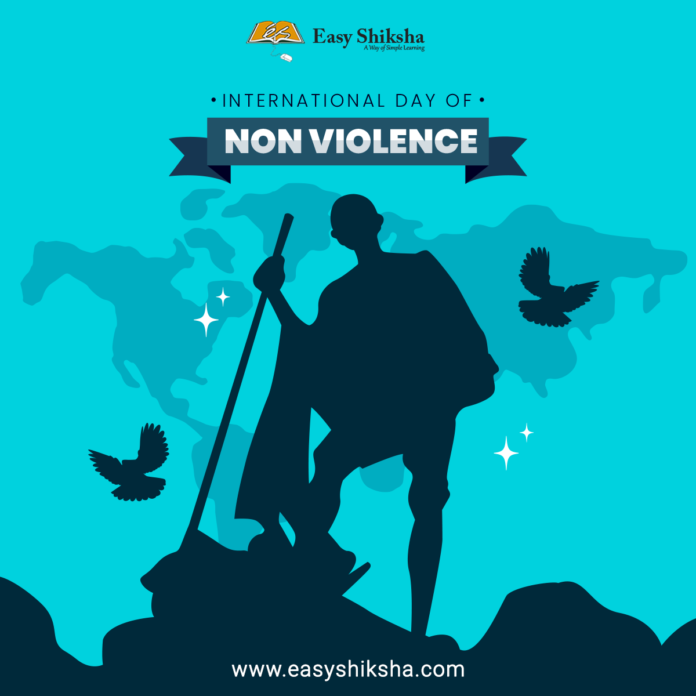Meaning of non-violence
The concept of non-violence, also known as non-violent conflict, does not allow the use of physical violence to achieve social or political change. Often portrayed as “the politics of the common people”, this outward manifestation of civil strife has been embraced by the international community in the pursuit of social justice. At the same time as violence is often used as the same word for pacifism, since the middle of the twentieth century the term non-violence was promoted for social change.

Important Announcement – EasyShiksha has now started Online Internship Program “Ab India Sikhega Ghar Se”

He is remembered for his inclusion in India’s independence and for his humanitarian contribution to the issue of discrimination and non-discrimination. He educated the people on Ahimsa values, which convinced them to use non-violence as a means of resolving a peaceful diversity. India added its independence on August 15, 1947, through Gandhi’s efforts. He was executed on January 30, 1948.
Gandhi Ji has been promoting the non-violent movement of civil rights and social change from one corner of the world to the other. Throughout his life, Gandhi was devoted to his belief in nonviolence under dictatorial conditions and in the face of major challenges.
The magnificent Salt March of 1930, led by Gandhi was trying to use nonviolence to achieve an inactive society. He said Indians should not use violence in their struggle for freedom from exploitation.This day is a time to spread the importance of non-violence, combined with education and public awareness. This commandment further reinforces the belief and protects the culture of harmony, inclination, empathy and non-violence.
Top Courses in Software Engineering
In a resolution passed at the General Assembly on behalf of the 140 donors, the Indian Foreign Minister, Mr. philosophy. In the words of the late leader himself, “Nonviolence is the greatest force in humanity. It is stronger than the most powerful weapon of destruction made by human ingenuity.”
UN Acknowledgement
In 2007, the UN General Assembly decided to launch the International Day for Non-Violence. This calendar day aims to raise awareness of non-violence, education and public awareness. The decision has shown worldwide respect for Gandhi and his philosophy. The first International Day for Non-Violence was October 2, 2007.
Activities on 2nd October
World Non-Violence Day is celebrated with various activities and activities such as newsletters and competitions to promote the day, public talks, conferences and journalists’ conferences on non-violence. Graphics exhibitions highlight various social issues.To promote nonviolence, street games or celebrity talks are held. Interfaith meetings are held.
International Day of Non-Violence has complex organizations and processes and methods by the great leader Mahatma Gandhi, known as the “Father of the Nation” of India.
Remembering his teachings
The four words – truth, non-violence, sarvodaya and satyagraha – from Gandhi and his teaching. The first two are the main principles of Gandhian thought – satya and ahimsa – which have a broader meaning than their English translation.
The basic premise, the Truth, is to motivate all his thoughts and actions. It was to realize that the inescapable harmony exists in all creation and that any violation of this harmony can be catastrophic. He saw this principle applied to all religions, which led to his equal respect for all religions. Vasudhaiva Kutumbakam of the Vedic tradition was no different from the Quranic belief that Allah is Merciful and Merciful if everything we see and hear about and that He will bring justice on the basis of deeds and not the religion they claim is individual. And it was no different from the Christian faith that God’s love and blessing were for all without exception and otherwise. All religions emphasize the equality of the human race and the development of a harmonious relationship with the whole universe. Any violation of the principle of equality replaces conflict and violation.
Empower your team. Lead the industry
Get a subscription to a library of online courses and digital learning tools for your organization with EasyShiksha
Request NowQ. Are EasyShiksha's internships truly free?
Yes, all internships offered by EasyShiksha are completely free of charge.
Q. How can I apply for an internship with EasyShiksha?
You can apply by visiting our website, browsing available internships, and following the application instructions provided.
Q. What types of internships are available through EasyShiksha?
EasyShiksha offers a wide range of internships across technology, business, marketing, healthcare, and more. Opportunities are continuously updated.
Q. Will I receive a certificate upon completing an internship?
Yes, upon successful completion, you will receive a certificate recognizing your participation and achievements.
Q. Are EasyShiksha's internship certificates recognized by universities and employers?
Yes, the certificates are recognized by universities, colleges, and employers worldwide.
Q. Is the download of certificates free or paid?
Access to internships and courses is free, but there is a small fee to download certificates, covering administrative costs.
Q. When can I start the course?
You can choose any course and start immediately without delay.
Q. What are the course and session timings?
These are fully online courses. You can learn at any time and pace. We recommend following a routine, but it depends on your schedule.
Q. What will happen when my course is over?
After completion, you will have lifetime access to the course for future reference.
Q. Can I download the notes and study material?
Yes, you can access and download course materials and have lifetime access for future reference.
Q. What software/tools would be needed for the course?
All necessary software/tools will be shared during the training as needed.
Q. I’m unable to make a payment. What should I do?
Try using a different card or account. If the problem persists, email us at info@easyshiksha.com.
Q. Do I get the certificate in hard copy?
No, only a soft copy is provided, which can be downloaded and printed if required.
Q. The payment got deducted but shows “failed”. What to do?
Technical errors may cause this. The deducted amount will be returned to your account in 7-10 working days.
Q. Payment was successful but dashboard shows ‘Buy Now’?
Sometimes payment reflection is delayed. If it takes longer than 30 minutes, email info@easyshiksha.com with the payment screenshot.
Q. What is the refund policy?
If you face technical issues, you can request a refund. No refunds are issued once the certificate has been generated.
Q. Can I enroll in a single course?
Yes, select the course of interest, fill in the details, make payment, and start learning. You will also earn a certificate.
Q. My questions are not listed above. I need further help.
Contact us at info@easyshiksha.com for further assistance.
ALSO READ: mumbai-at-the-global-citizen
Get Course: Programming-with-C-and-C-Plus-Plus
You can get complete course & Internship program details from here







































































